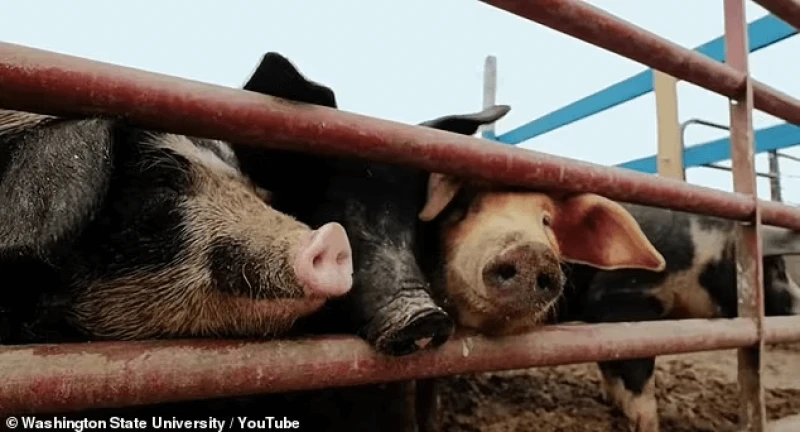Disease-free pigs: CRISPR gene-edited animals in development resist virus that has decimated pork farms for decades
Disease-free pigs: CRISPR gene-edited animals in development resist virus that has decimated pork farms for decades


CRISPR-based genome editing has already been successfully applied to sickle cell disease and additional companies are working on developing their CRISPR-based therapeutics. It seems only natural that the technology would make its way to animals. Now a team of scientists at Genus, a British animal genetics company with research facilities in Wisconsin and Tennessee, have developed a new generation of CRISPR-edited pigs that are resistant to porcine reproductive and respiratory syndrome (PRRS) virus, a disease that has had a widespread impact on porcine populations around the world for decades.
Details of exactly how the pigs were edited are published in a new report published in The CRISPR Journal titled, “Generation of a Commercial-Scale Founder Population of Porcine Reproductive and Respiratory Syndrome Virus Resistant Pigs Using CRISPR-Cas.”
Genus works on improving the genetics of livestock to ensure healthy, robust pigs and cattle for agricultural production, Elena Rice, PhD, Genus’ CSO and head of research and development and a co-author on the paper told GEN. “Livestock have a lot of diseases, and there are several that [are] just really devastating for farmers,” Rice said. Until the recent emergence of African swine flu, PRRS infections topped that list.
This is an excerpt. Read the original post here

 | Videos | More... |

Video: Nuclear energy will destroy us? Global warming is an existential threat? Chemicals are massacring bees? Donate to the Green Industrial Complex!
 | Bees & Pollinators | More... |

GLP podcast: Science journalism is a mess. Here’s how to fix it

Mosquito massacre: Can we safely tackle malaria with a CRISPR gene drive?

Are we facing an ‘Insect Apocalypse’ caused by ‘intensive, industrial’ farming and agricultural chemicals? The media say yes; Science says ‘no’
 | Infographics | More... |

Infographic: Global regulatory and health research agencies on whether glyphosate causes cancer
 | GMO FAQs | More... |

Why is there controversy over GMO foods but not GMO drugs?

How are GMOs labeled around the world?

How does genetic engineering differ from conventional breeding?
 | GLP Profiles | More... |

Alex Jones: Right-wing conspiracy theorist stokes fear of GMOs, pesticides to sell ‘health supplements’




 Viewpoint — Fact checking MAHA mythmakers: How wellness influencers and RFK, Jr. undermine American science and health
Viewpoint — Fact checking MAHA mythmakers: How wellness influencers and RFK, Jr. undermine American science and health Viewpoint: Video — Big Solar is gobbling up productive agricultural land and hurting farmers yet providing little energy or sustainabilty gains
Viewpoint: Video — Big Solar is gobbling up productive agricultural land and hurting farmers yet providing little energy or sustainabilty gains Fighting deforestation with CO2: Biotechnology breakthrough creates sustainable palm oil alternative for cosmetics
Fighting deforestation with CO2: Biotechnology breakthrough creates sustainable palm oil alternative for cosmetics Trust issues: What happens when therapists use ChatGPT?
Trust issues: What happens when therapists use ChatGPT? 30-year-old tomato line shows genetic resistance to devastating virus
30-year-old tomato line shows genetic resistance to devastating virus California, Washington, Oregon forge immunization alliance to safeguard vaccine access against federal undermining
California, Washington, Oregon forge immunization alliance to safeguard vaccine access against federal undermining The free-range chicken dilemma: Better for birds, but with substantial costs
The free-range chicken dilemma: Better for birds, but with substantial costs ‘You have to treat the brain first’: Rethinking chronic pain with Sanjay Gupta
‘You have to treat the brain first’: Rethinking chronic pain with Sanjay Gupta
